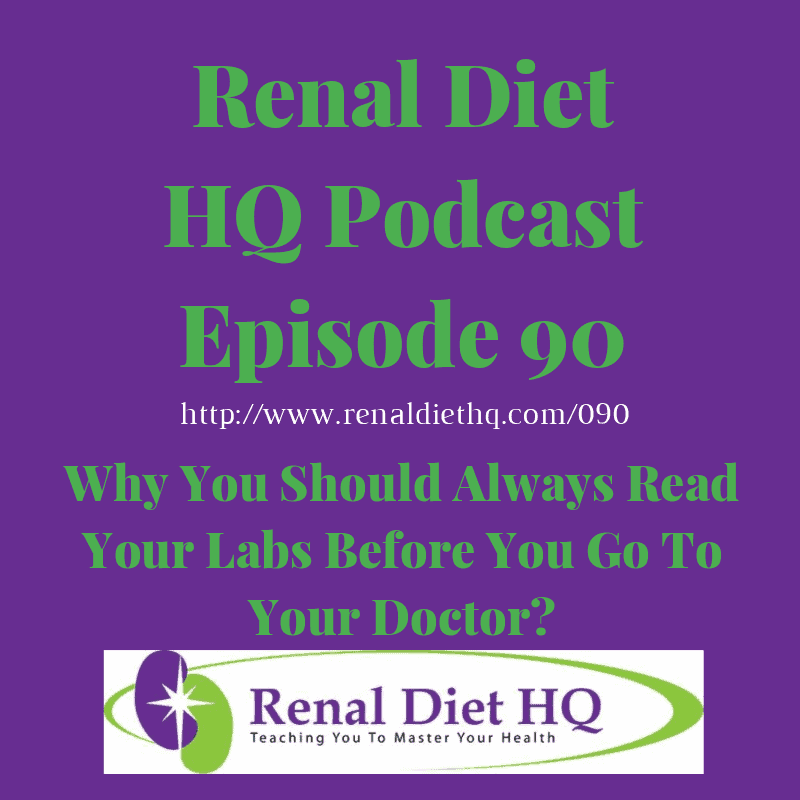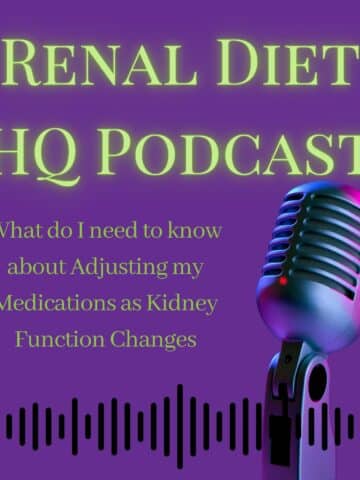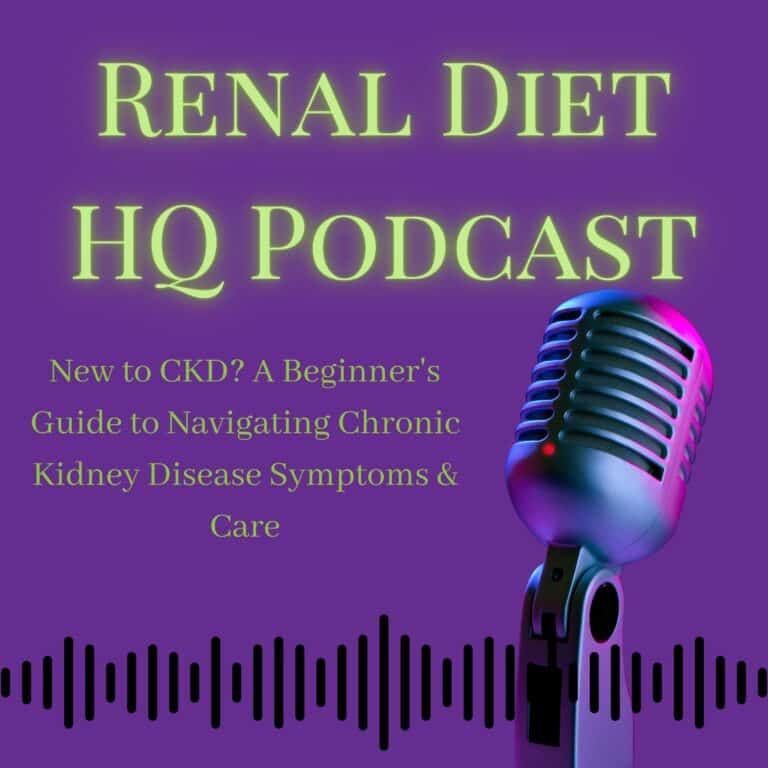RDHQ Podcast 90: Why You Should Always Read Your Labs Before You Go To Your Doctor
Podcast: Play in new window | Download

Hi there! This is Mathea Ford, the creator of the Understanding Your Kidney Test Results course and today I want to talk to you about something that is really important to me. I want to talk about something that I suddenly realized was happening when I with... to a lot of people with kidney disease. It's something that's really holding you back and really keeping you from being able to move forward or understand your labs better and what to do next.
So it's the idea that you can read your labs and know what they mean or asking your doctor what they mean is going to somehow tell you what to do next perhaps your doctor even never told you that you had kidney disease and you find out by looking at your labs and you wondered what to do and so you started googling. So what
happens is you go you find your labs and you realize that they say that your eGFR is high or low and it's out of whack and all of a sudden you start googling and looking around and your doctor never even mentioned it to you or they tell your eGFR is high but they don't tell you what to do next.
So, you don't know how to address that so again start googling and you may find the information you may not find reputable good information or you may not. So, you know what your labs are and you know what is a normal range because a lot of times on the paperwork it will show you the normal range. The normal range might be for potassium, for example, like three point five to five and so you're in that normal range but do you know what to do with that knowledge on how to change?
So maybe your EGFR is high and you google and you find out that means for a kidney diet that you should restrict protein and salts and maybe even these this information says you should also restrict protein and potassium. I mean protein, phosphorus, and potassium but for a regular kidney patient, it's typically only the protein and the salt that you have to worry about but a lot of people restrict potassium because they don't know if they should or not. They don't know if their labs are okay or not so I understand why people believe that just knowing and they're
like make a few changes or maybe they make a ton of changes and then you don't know really what was important or what might have worked so I'm actually a believer in making the least restrictive diet if possible because it will get more restrictive and it will change over time but it's valuable to adjust your protein intake based on the stage of kidney failure you're in for sure but it's a little bit of a misnomer to not realize that there's more depth to that
that there are other labs that should be taken or there are other ways to know whether you're processing or progressing quickly and your kidney disease is getting worse or you can slow down kidney disease.
There are some other labs that maybe your doctor didn't even measure that would tell you "hey! this means it's progressing quickly we need to make more changes" or maybe they didn't measure your potassium and phosphorus and you don't know what you should do but that's why so many people start restricting every single thing. They limit their diet, they excessively limit their diet. They end up with a diet that's hard to follow and hard to tolerate and they might get upset or frustrated so you find out you have a 45 eGFR but you don't know if it's
progressing quickly or not so you suddenly switch and change everything you stop eating salt, you cut out protein, and unfortunately, I've heard from several people that their doctors just told them to eat no protein and while it
seems like doing a little bit of a change would be good and a whole lot would be even better the truth of the matter is that if you limit your protein if you cut out completely all your protein you're going to put yourself in worse shape and you potentially are going to be sicker and then you're not gonna be able to recover because your body uses proteins for tons of things in your body.
So, a lot of times there's an optimum range and that can be as you get your labs it can adjust and as you progress or don't progress with kidney disease you find out how much the improvement you can make but your doctors don't know a lot about nutrition that's what dietitians are for.
Dietitians understand the value of how your food is in your body and what kind of reactions that are going to affect. Not that doctors don't know but they a lot of times have very limited education in nutrition. So, what you really should do is understand all the labs and the whole picture and really being able to know that just one lab
being out of whack; how to adjust that or adjust your diet or know what you should even ask your doctor to about your medications so I'm never going to tell you to change medications but I am going to point out to you that there are certain medications that can affect certain labs and that is why you should talk to your doctor and say "is this the right medication? Is this affecting my kidney disease? Is it time to go to a nephrologist?" That type of thing "how quickly is my disease progressing?"
There are certain labs that will tell you that and that allows you to be an advocate for yourself and for you to be in control of your health in a lot more positive ways than just waiting for the next lab or just waiting to get on dialysis because it's really important that you do everything you can even once you've found out you have kidney disease you may have found out you have kidney disease and at that point you've lost a lot of capacity but your kidneys are remarkable and if you can do certain things to change that lowering your protein, lower your sodium and adjusting based on the other labs you really can do things to help your diet and help your kidneys slow down the progression of kidney disease.
What I teach people as a Registered Dietitian and a person that's knowledgeable about nutrition's effects on your labs and other things that affect your labs is that the best way to review your labs is to look at them over a period of time. So, ask your doctor the right questions and you can get clear answers. So, when you look at your eGFR, it's really a trend so one measurement of eGFR might be the next measurement might be over 60 and the next measurement then comes back as 45. If you look at that trend you realize okay overall it's going down. That's a signal there are some other labs you want to look at is that going up or going down and when you put that all together and then you talk to your doctor in and you know to ask them specifically about labs - specific things - and how your medications might affect that, how your diet can affect that then you understand the whole picture. You understand what you can do to slow down the progression of kidney disease when you understand your kidney test results and that's not just your labs it's also your weight, it's also your diabetes which is labs and other things and then also blood pressure so it's understanding all those things and what they mean and what is actually the expectation at different stages.
So, actually you may not know this but when you're diabetic if your diabetes suddenly starts getting better without you doing anything that's a sign that your kidney disease is progressing because your kidneys are interrelated so close together that your kidneys actually help how much insulin you removed from your body so at some point in your kidney disease if your insulin is not able to be removed from your body it's going to continue to work longer and that's gonna cause your blood sugars may be to go down but that's an indication that your kidneys are not working properly. So knowing... Okay this is what this means is important, you may just thought "oh hey! Look amazingly my diabetes got better!" But that's really not what it maybe did get better but that's not a positive thing at that point.
So, in the meantime, before I've got some more to talk to you about related to this but I want you to
head on over and get on the waitlist and get my informational packet about the process to go through and understand your labs and that's gonna be at renaldiethq.com/waitlist-for-uktr Understanding Kidney Test Results. That's the course I'm working on and that's what I want to talk to you more about.
Learn more About What Are Different Types of Vegetarians?
Learn more About RDHQ Podcast 91: What if it works? My thoughts on your future.
More Renal Diet HQ Podcast
- Can I Eat Quinoa on a Renal Diet? | Kidney-Friendly Food Tips-Podcast
- Which Drinks Are SAFE for a Renal Diet? The Answers Might Surprise You!-Podcast
- What BBQ Foods Are Kidney-Friendly? Let’s Break It Down!-Podcast
- What do I need to know about Adjusting my Medications as Kidney Function Changes-Podcast







